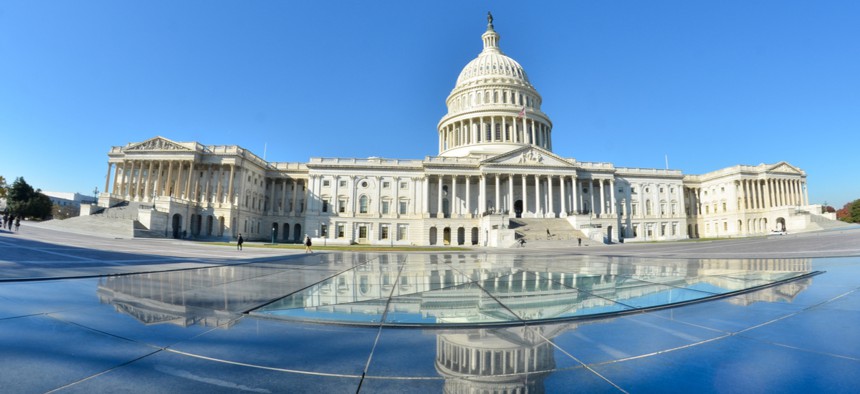Congress Wrestles with Shutdown Deadline and Data Breach Drama

Orhan Cam/Shutterstock.com
Lawmakers also introduced a bill to curb revenge porn.
Government funding runs out Dec. 8 but lawmakers are still working out how to avoid a shutdown.
House Republicans Thursday shared a plan to extend funds for two weeks beyond the current expiration date, with the possibility of a second continuing resolution around the Christmas holiday. The Washington Post Friday reported some Republican lawmakers were against such a measure and the number of Democrats who would support it was unclear.
Concealed a Data Breach? Go Straight to Jail
Company executives that don’t disclose data breaches could face jail time under a new bill introduced by Senate Commerce Committee Democrats Thursday.
The threat of up to five years of prison time would apply to any executive who knew about, but didn’t disclose, a breach that resulted in any individual losing $1,000 or more, according to the bill introduced by Commerce ranking member Bill Nelson, D-Fla., along with Sens. Richard Blumenthal, D-Conn., and Tammy Baldwin, D-Wisc.
The bill comes in the wake of news that Uber paid hackers a $100,000 ransom in exchange for keeping secret a breach that affected 57 million customers. It also comes amid renewed interest in how and when Americans are notified about data breaches after a breach at the credit rating agency Equifax that affected nearly half of all Americans.
Did Uber Hack Back?
Speaking of Uber, in addition to illegally concealing a massive data breach from its customers, the ride-sharing service may also have violated anti-hacking laws, Sen. Mark Warner, D-Va., wrote Monday in a letter to the company’s CEO.
Uber executives acknowledged earlier this month that, in addition to paying off the hackers in exchange for not disclosing the breach, the company also found the hackers and convinced them to sign non-disclosure agreements. Given Uber’s past record of bad conduct, it’s reasonable to ask whether the company violated a law against hacking back in its effort to strike that deal, Warner wrote.
Senate Finance Committee Republicans, including Chairman Orrin Hatch, R-Utah, sent Uber a separate list of questions Monday seeking details about the breach timeline, how and when regulators were notified and if customer social security numbers were affected in any way.
Will ENOUGH Be Enough?
A bipartisan group introduced a bill to target revenge porn and other efforts to public-shame or blackmail people by sharing sexually explicit photos of subjects without their permission. Sens. Kamala Harris, D-Calif., Richard Burr, R-N.C., and Amy Klobuchar, D-Minn., introduced the Ending Nonconsensual Online User Graphic Harassment Act, aka the ENOUGH Act, to ensure the Justice Department has tools to pursue people who post “nonconsensual pornography” and create a federal criminal liability for those who share the pictures.
Rep. Jackie Speier, D-Calif., who introduced a version of the legislation last session, put forth the House version that already has seven co-sponsors. Dozens of other organizations also expressed support, including tech companies such as Facebook and Twitter and law enforcement groups such as the Federal Law Enforcement Officers Association.
What’s the Hold Up, FBI?
Rep. Ted Lieu, D-Calif., pressed FBI Director Christopher Wray Tuesday about an Associated Press report that the bureau only notified a fraction of U.S. officials whose Gmail accounts were targeted by one of the Russian government hacking groups that targeted Democratic political organizations during the 2016 election. Lieu wants a congressional briefing on why the FBI delayed notifying officials and what the bureau’s policy is for alerting targets.
Better Information for Students, Better Privacy Protections
A bill that would give prospective college students and their families access to enhanced information about colleges and universities’ graduation rates, average student debt levels and other information would also require the higher education institutions to encrypt the source of information to protect student privacy.
The Student Right to Know Before You Go Act was sponsored by Sens. Marco Rubio, R-Fla., Mark Warner, D-Va., and Ron Wyden, D-Or.
Coming Up
NASA and Government Accountability Office officials testify Wednesday to a House Science, Space and Technology subcommittee about the space agency’s next four telescopes. Senate Homeland Security and Governmental Affairs will listen to officials from the Defense and Homeland Security departments, FBI and the Office of National Director of Intelligence discuss international terrorist threats.
Thursday kicks off with FBI Director Christopher Wray an oversight hearing before the House Judiciary Committee and Senate Armed Services diving into Defense Department acquisition reforms. House Oversight and Reform has an afternoon hearing about IT and cybersecurity at the Veterans Affairs Department.
A House Energy and Commerce panel will hear about the Energy Department’s role in cybersecurity for the energy sector Friday morning.





